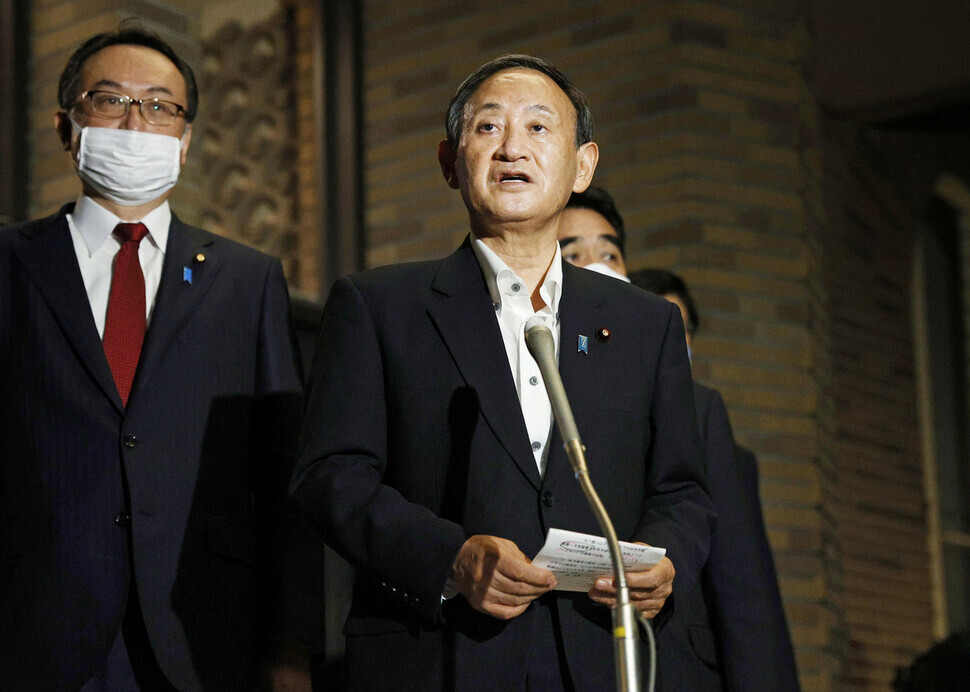hankyoreh
Links to other country sites 다른 나라 사이트 링크
[News analysis] Why has Suga been so cold toward S. Korea thus far?

“When I joined the world of politics in Yokohama 45 years ago, without any relatives here or other connections to the region, I found myself at your office, Mr. Okonogi.”
On Sept. 21, a Japanese holiday known as Respect for the Aged Day, Japanese Prime Minister Yoshihide Suga paid a visit to the grave of his benefactor, Hikosaburo Okonogi, former minister of construction. In 1975, Suga was hired as Okonogi’s secretary, a position he held for the next 11 years. After that, he served on the Yokohama city council, which proved to be his launchpad for a seat in Japan’s House of Representatives in 1996.
Those years seem to have made a big impression on Suga, because his words on Monday were filled with emotion, despite his reputation for being detail-oriented, cool-headed, and married to the job. Speaking to a crowd of reporters, Suga said, “I will do my best to meet expectations as part of a cabinet that works for the people.”
Upon Suga’s election as prime minister on Sept. 16, the Blue House sent a hopeful message calling for improving relations. “We’re ready to sit down at any time for dialogue and communication. We look forward to an enthusiastic response from Japan,” the message said.
But Japan’s response has been noncommittal. During a press conference on the evening of Sept. 20, Suga said he’d had phone calls from US President Donald Trump and Australian Prime Minister Scott Morrison. But so far, Suga hasn’t spoken on the phone with South Korean President Moon Jae-in, even after Moon emphasized that Japan is South Korea’s “closest neighbor” and that the two countries “share basic values and strategic interests.”
And when Suga responded to Moon’s congratulatory message on Sept. 19, his letter only contained perfunctory language about “overcoming difficult problems to build future-oriented bilateral relations.” This shows that Suga, who has promised to carry on the policies of his predecessor, former prime minister Shinzo Abe, is hesitant to move forward with improving relations with South Korea.
Moon administration’s reversal of comfort women agreement cemented Suga’s impression of KoreaWhile Suga is a hardheaded pragmatist, the incident that appears to have cemented his negative impression of South Korea was reportedly the Moon administration’s handling of the comfort women agreement that former President Park Geun-hye, Moon’s predecessor, had reached with Japan on Dec. 28, 2015.
“At the end of 2015, the governments of South Korea and Japan agreed on a final and irreversible solution to the comfort women issue. There was a possibility that South Korea would overturn that agreement, but I never thought our relations would go south this quickly,” Suga said in an interview in the latest issue of Bungei Shunju, a monthly magazine that represents the viewpoint of Japanese conservatives.
Suga was reportedly shocked to learn that Lee Byeong-gi — former Blue House chief of staff and former South Korean ambassador to Japan who had been South Korea’s point man in the negotiations — had later suffered various tribulations. This offers insight into the personality of a man who values personal relationships so much that he took time out of his busy schedule, so soon after being elected prime minister, to pay a thoughtful visit to Okonogi’s grave.
At the moment, South Korea and Japan are entangled with so many complicated disputes that it’s probably not possible to repair their relationship all at once. That’s why we need to be even-tempered, while persistent, in our attempts to improve relations. Seoul showed it was serious about improving relations last year with a statement on Aug. 15 and a special envoy from the president. But when Japan declined to engage, Seoul announced on Aug. 22, just one week later, that it would stop renewing its GSOMIA information-sharing agreement with Japan. Three months later, Seoul had to reverse course.
By Gil Yun-hyung, staff reporter
Please direct comments or questions to [english@hani.co.kr]

Editorial・opinion
![[Column] Park Geun-hye déjà vu in Yoon Suk-yeol [Column] Park Geun-hye déjà vu in Yoon Suk-yeol](https://flexible.img.hani.co.kr/flexible/normal/500/300/imgdb/original/2024/0424/651713945113788.jpg) [Column] Park Geun-hye déjà vu in Yoon Suk-yeol
[Column] Park Geun-hye déjà vu in Yoon Suk-yeol![[Editorial] New weight of N. Korea’s nuclear threats makes dialogue all the more urgent [Editorial] New weight of N. Korea’s nuclear threats makes dialogue all the more urgent](https://flexible.img.hani.co.kr/flexible/normal/500/300/imgdb/original/2024/0424/7317139454662664.jpg) [Editorial] New weight of N. Korea’s nuclear threats makes dialogue all the more urgent
[Editorial] New weight of N. Korea’s nuclear threats makes dialogue all the more urgent- [Guest essay] The real reason Korea’s new right wants to dub Rhee a founding father
- [Column] ‘Choson’: Is it time we start referring to N. Korea in its own terms?
- [Editorial] Japan’s rewriting of history with Korea has gone too far
- [Column] The president’s questionable capacity for dialogue
- [Column] Are chaebol firms just pizza pies for families to divvy up as they please?
- [Column] Has Korea, too, crossed the Rubicon on China?
- [Correspondent’s column] In Japan’s alliance with US, echoes of its past alliances with UK
- [Editorial] Does Yoon think the Korean public is wrong?
Most viewed articles
- 1[Column] Park Geun-hye déjà vu in Yoon Suk-yeol
- 2Will NewJeans end up collateral damage in internal feud at K-pop juggernaut Hybe?
- 3N. Korean hackers breached 10 defense contractors in South for months, police say
- 4Thursday to mark start of resignations by senior doctors amid standoff with government
- 5[Guest essay] The real reason Korea’s new right wants to dub Rhee a founding father
- 6Kim Jong-un expressed ‘satisfaction’ with nuclear counterstrike drill directed at South
- 7Up-and-coming Indonesian group StarBe spills what it learned during K-pop training in Seoul
- 8Why Korea shouldn’t welcome Japan’s newly beefed up defense cooperation with US
- 9Opposition calls Yoon’s chief of staff appointment a ‘slap in the face’
- 10Terry Anderson, AP reporter who informed world of massacre in Gwangju, dies at 76